Organisational Behaviour Report: A David & Co Limited Case Study
VerifiedAdded on 2020/12/26
|15
|5217
|363
Report
AI Summary
This report delves into the realm of organisational behaviour, examining the influence of culture, politics, and power on individual behaviour within an organisational context, specifically using A David & Co Limited as a case study. It explores Handy's model of organisational culture, including power, task, role, and person cultures, and analyses various sources of organisational power such as legitimate, expert, coercive, referent, and reward power. The report further evaluates content and process theories of motivation, including expectancy theory and Maslow's hierarchy of needs, and how these theories can be applied to effectively achieve organisational goals. Additionally, it differentiates between effective and ineffective teams and applies concepts and philosophies of organisational behaviour to a business context, offering insights into globalization, digitalization, and their impact on organisational strategies and networks. The report concludes with a comprehensive overview of the application of these concepts within A David & Co Limited, providing recommendations for enhanced employee performance and achieving business objectives.
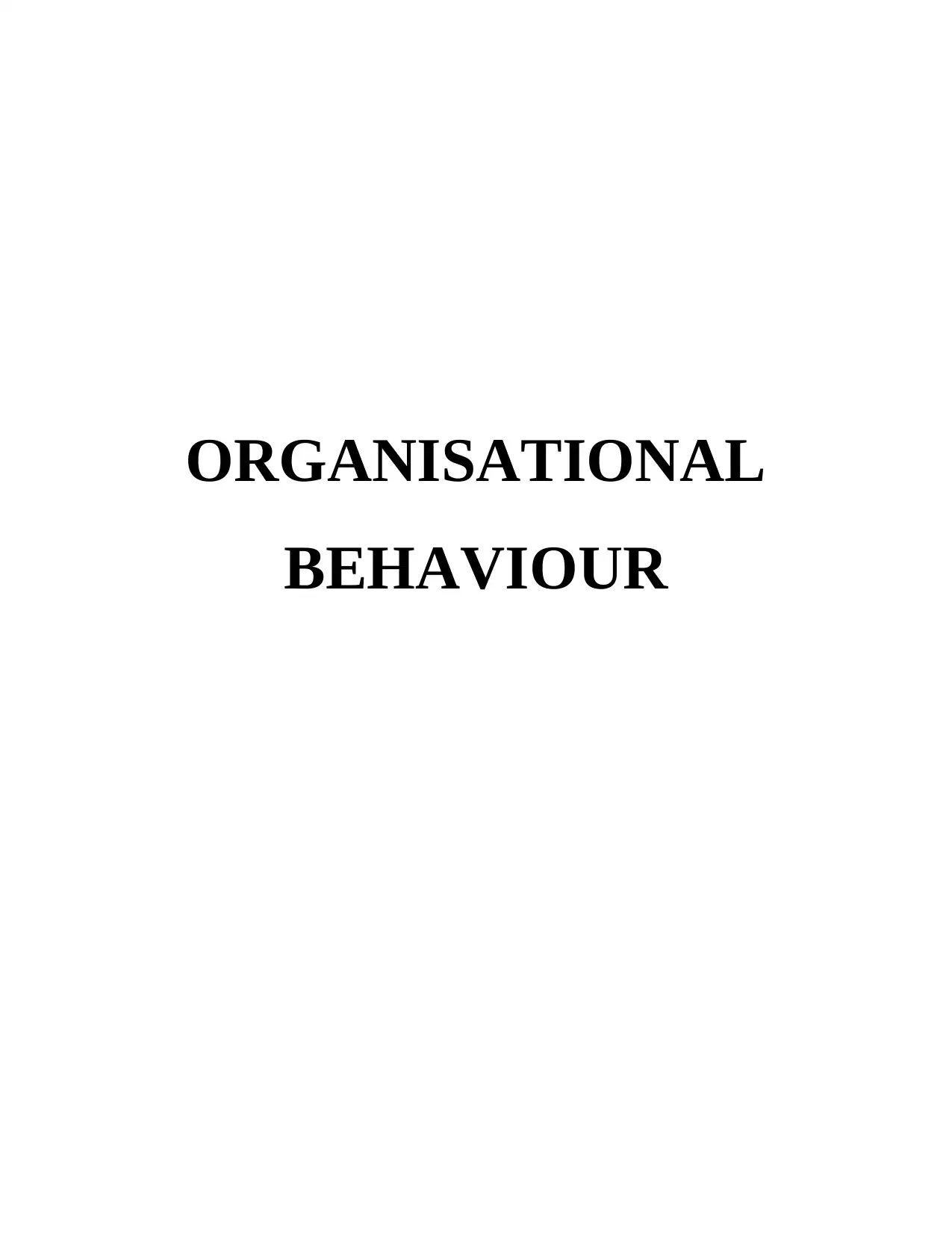
ORGANISATIONAL
BEHAVIOUR
BEHAVIOUR
Paraphrase This Document
Need a fresh take? Get an instant paraphrase of this document with our AI Paraphraser
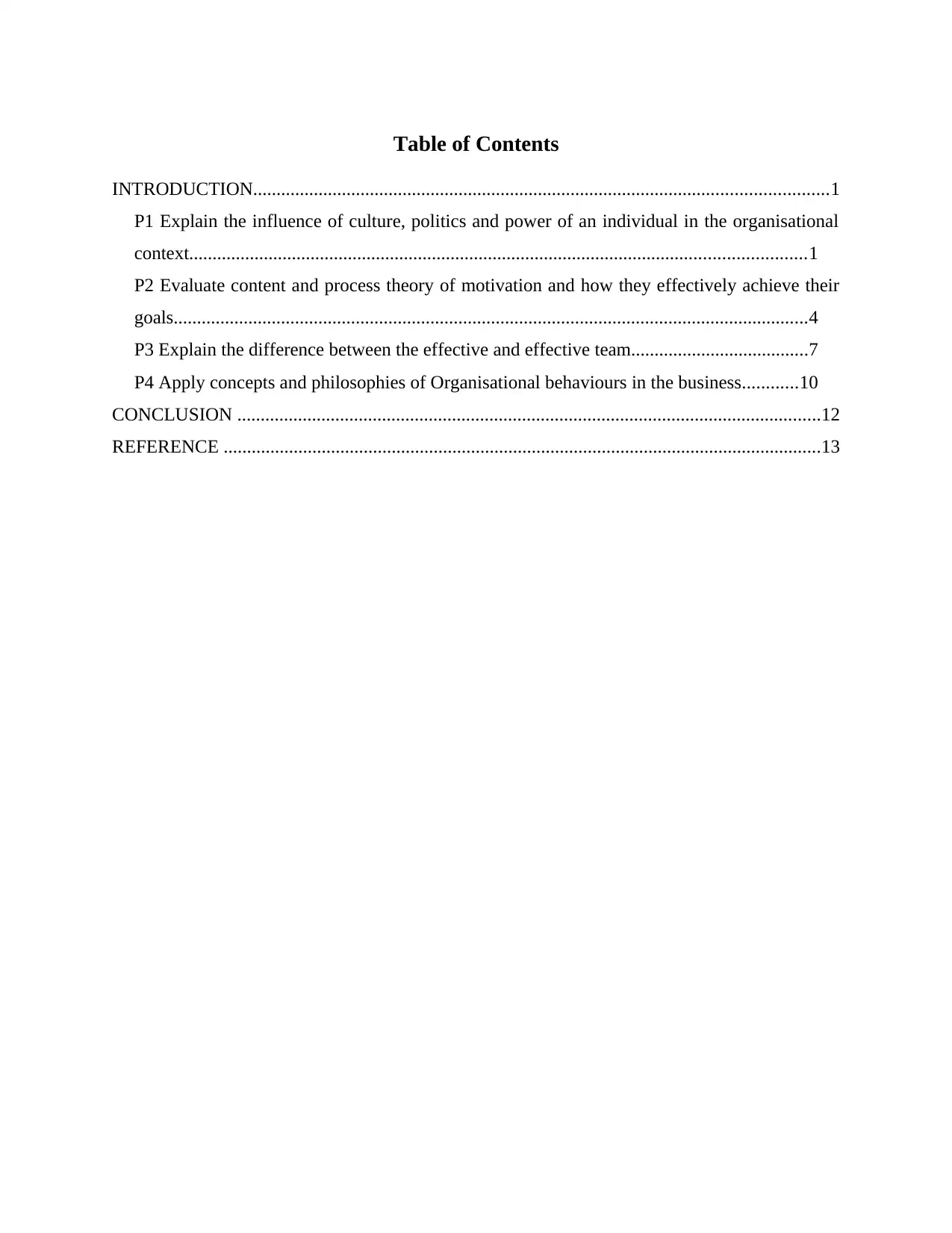
Table of Contents
INTRODUCTION...........................................................................................................................1
P1 Explain the influence of culture, politics and power of an individual in the organisational
context....................................................................................................................................1
P2 Evaluate content and process theory of motivation and how they effectively achieve their
goals........................................................................................................................................4
P3 Explain the difference between the effective and effective team......................................7
P4 Apply concepts and philosophies of Organisational behaviours in the business............10
CONCLUSION .............................................................................................................................12
REFERENCE ................................................................................................................................13
INTRODUCTION...........................................................................................................................1
P1 Explain the influence of culture, politics and power of an individual in the organisational
context....................................................................................................................................1
P2 Evaluate content and process theory of motivation and how they effectively achieve their
goals........................................................................................................................................4
P3 Explain the difference between the effective and effective team......................................7
P4 Apply concepts and philosophies of Organisational behaviours in the business............10
CONCLUSION .............................................................................................................................12
REFERENCE ................................................................................................................................13
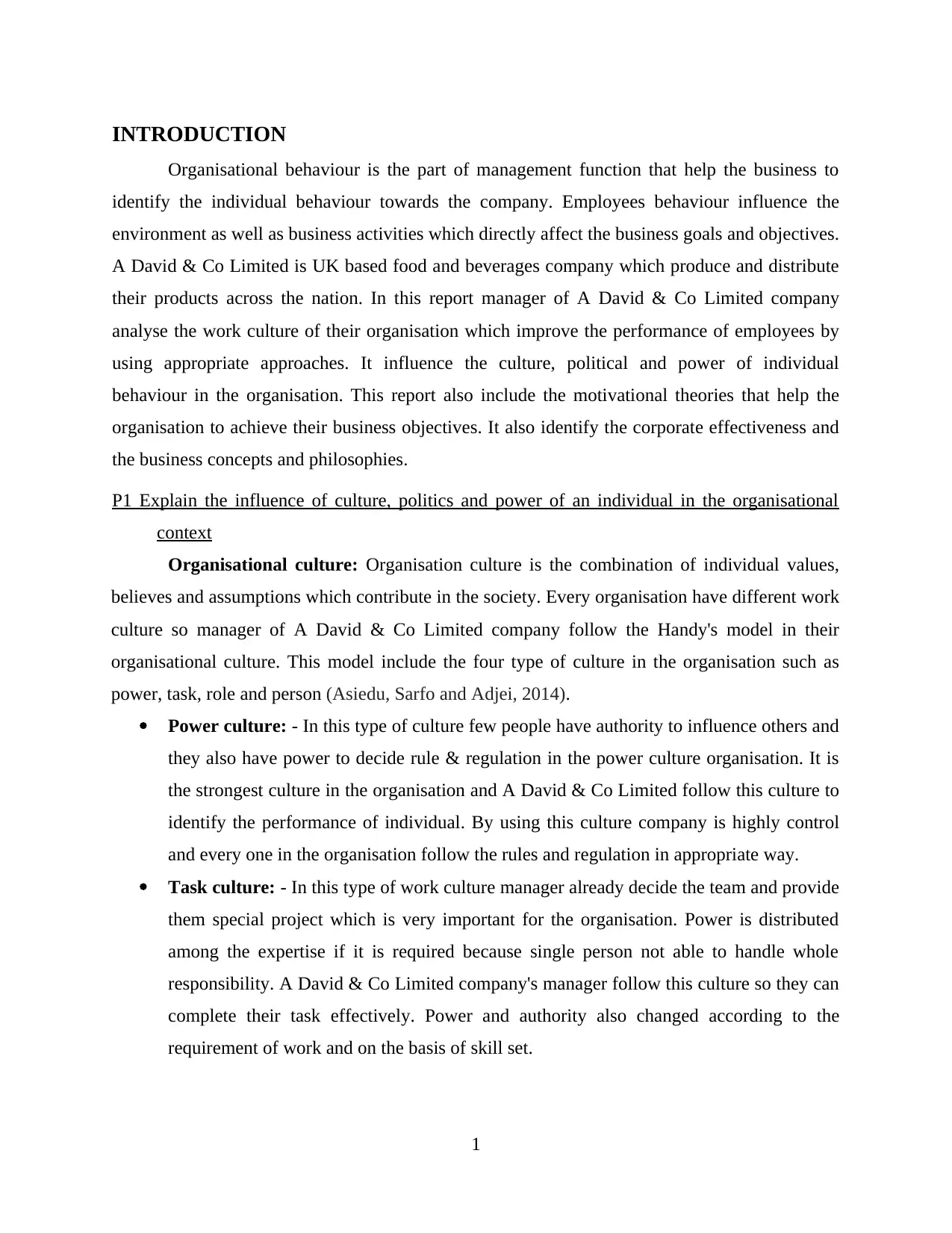
INTRODUCTION
Organisational behaviour is the part of management function that help the business to
identify the individual behaviour towards the company. Employees behaviour influence the
environment as well as business activities which directly affect the business goals and objectives.
A David & Co Limited is UK based food and beverages company which produce and distribute
their products across the nation. In this report manager of A David & Co Limited company
analyse the work culture of their organisation which improve the performance of employees by
using appropriate approaches. It influence the culture, political and power of individual
behaviour in the organisation. This report also include the motivational theories that help the
organisation to achieve their business objectives. It also identify the corporate effectiveness and
the business concepts and philosophies.
P1 Explain the influence of culture, politics and power of an individual in the organisational
context
Organisational culture: Organisation culture is the combination of individual values,
believes and assumptions which contribute in the society. Every organisation have different work
culture so manager of A David & Co Limited company follow the Handy's model in their
organisational culture. This model include the four type of culture in the organisation such as
power, task, role and person (Asiedu, Sarfo and Adjei, 2014).
Power culture: - In this type of culture few people have authority to influence others and
they also have power to decide rule & regulation in the power culture organisation. It is
the strongest culture in the organisation and A David & Co Limited follow this culture to
identify the performance of individual. By using this culture company is highly control
and every one in the organisation follow the rules and regulation in appropriate way.
Task culture: - In this type of work culture manager already decide the team and provide
them special project which is very important for the organisation. Power is distributed
among the expertise if it is required because single person not able to handle whole
responsibility. A David & Co Limited company's manager follow this culture so they can
complete their task effectively. Power and authority also changed according to the
requirement of work and on the basis of skill set.
1
Organisational behaviour is the part of management function that help the business to
identify the individual behaviour towards the company. Employees behaviour influence the
environment as well as business activities which directly affect the business goals and objectives.
A David & Co Limited is UK based food and beverages company which produce and distribute
their products across the nation. In this report manager of A David & Co Limited company
analyse the work culture of their organisation which improve the performance of employees by
using appropriate approaches. It influence the culture, political and power of individual
behaviour in the organisation. This report also include the motivational theories that help the
organisation to achieve their business objectives. It also identify the corporate effectiveness and
the business concepts and philosophies.
P1 Explain the influence of culture, politics and power of an individual in the organisational
context
Organisational culture: Organisation culture is the combination of individual values,
believes and assumptions which contribute in the society. Every organisation have different work
culture so manager of A David & Co Limited company follow the Handy's model in their
organisational culture. This model include the four type of culture in the organisation such as
power, task, role and person (Asiedu, Sarfo and Adjei, 2014).
Power culture: - In this type of culture few people have authority to influence others and
they also have power to decide rule & regulation in the power culture organisation. It is
the strongest culture in the organisation and A David & Co Limited follow this culture to
identify the performance of individual. By using this culture company is highly control
and every one in the organisation follow the rules and regulation in appropriate way.
Task culture: - In this type of work culture manager already decide the team and provide
them special project which is very important for the organisation. Power is distributed
among the expertise if it is required because single person not able to handle whole
responsibility. A David & Co Limited company's manager follow this culture so they can
complete their task effectively. Power and authority also changed according to the
requirement of work and on the basis of skill set.
1
⊘ This is a preview!⊘
Do you want full access?
Subscribe today to unlock all pages.

Trusted by 1+ million students worldwide
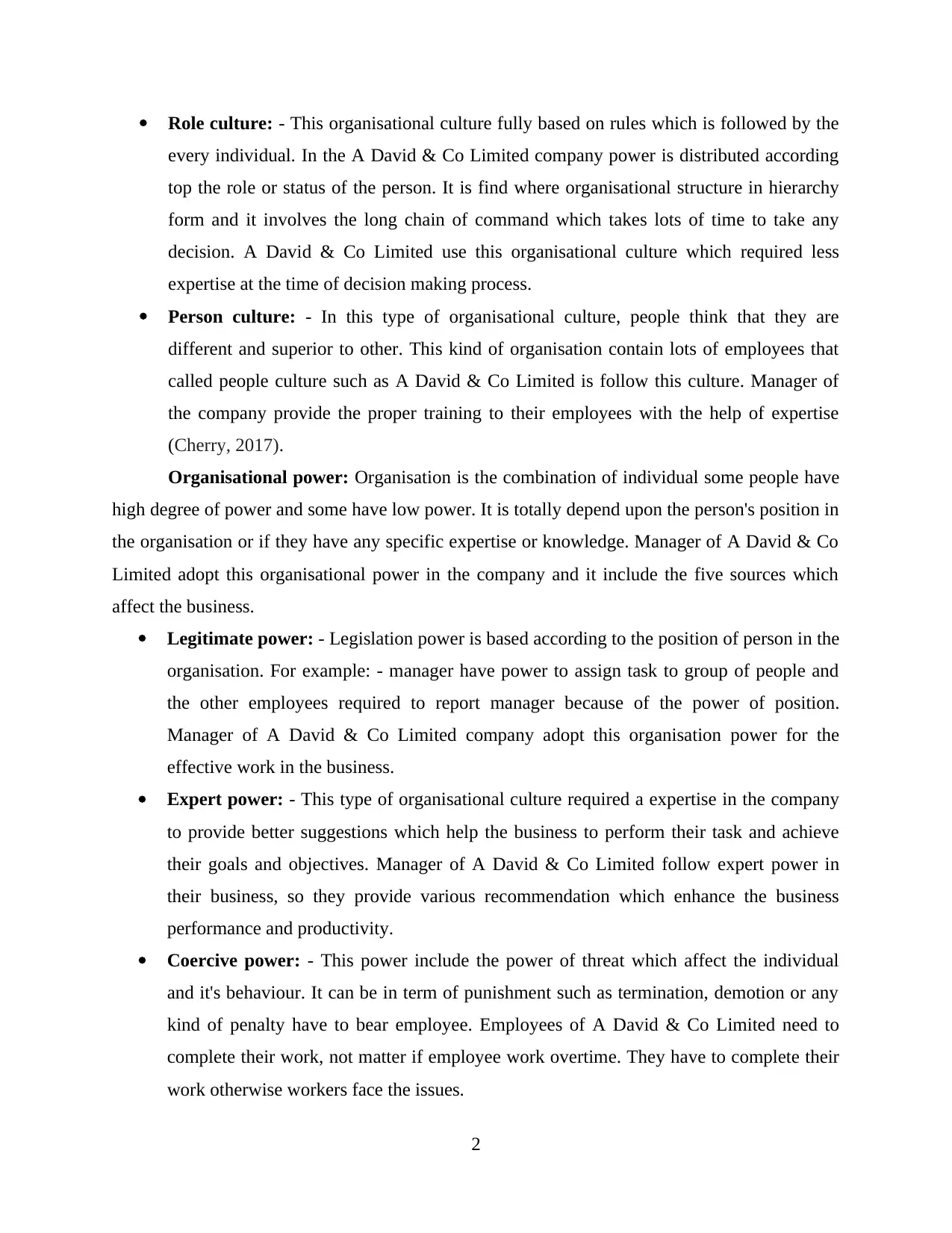
Role culture: - This organisational culture fully based on rules which is followed by the
every individual. In the A David & Co Limited company power is distributed according
top the role or status of the person. It is find where organisational structure in hierarchy
form and it involves the long chain of command which takes lots of time to take any
decision. A David & Co Limited use this organisational culture which required less
expertise at the time of decision making process.
Person culture: - In this type of organisational culture, people think that they are
different and superior to other. This kind of organisation contain lots of employees that
called people culture such as A David & Co Limited is follow this culture. Manager of
the company provide the proper training to their employees with the help of expertise
(Cherry, 2017).
Organisational power: Organisation is the combination of individual some people have
high degree of power and some have low power. It is totally depend upon the person's position in
the organisation or if they have any specific expertise or knowledge. Manager of A David & Co
Limited adopt this organisational power in the company and it include the five sources which
affect the business.
Legitimate power: - Legislation power is based according to the position of person in the
organisation. For example: - manager have power to assign task to group of people and
the other employees required to report manager because of the power of position.
Manager of A David & Co Limited company adopt this organisation power for the
effective work in the business.
Expert power: - This type of organisational culture required a expertise in the company
to provide better suggestions which help the business to perform their task and achieve
their goals and objectives. Manager of A David & Co Limited follow expert power in
their business, so they provide various recommendation which enhance the business
performance and productivity.
Coercive power: - This power include the power of threat which affect the individual
and it's behaviour. It can be in term of punishment such as termination, demotion or any
kind of penalty have to bear employee. Employees of A David & Co Limited need to
complete their work, not matter if employee work overtime. They have to complete their
work otherwise workers face the issues.
2
every individual. In the A David & Co Limited company power is distributed according
top the role or status of the person. It is find where organisational structure in hierarchy
form and it involves the long chain of command which takes lots of time to take any
decision. A David & Co Limited use this organisational culture which required less
expertise at the time of decision making process.
Person culture: - In this type of organisational culture, people think that they are
different and superior to other. This kind of organisation contain lots of employees that
called people culture such as A David & Co Limited is follow this culture. Manager of
the company provide the proper training to their employees with the help of expertise
(Cherry, 2017).
Organisational power: Organisation is the combination of individual some people have
high degree of power and some have low power. It is totally depend upon the person's position in
the organisation or if they have any specific expertise or knowledge. Manager of A David & Co
Limited adopt this organisational power in the company and it include the five sources which
affect the business.
Legitimate power: - Legislation power is based according to the position of person in the
organisation. For example: - manager have power to assign task to group of people and
the other employees required to report manager because of the power of position.
Manager of A David & Co Limited company adopt this organisation power for the
effective work in the business.
Expert power: - This type of organisational culture required a expertise in the company
to provide better suggestions which help the business to perform their task and achieve
their goals and objectives. Manager of A David & Co Limited follow expert power in
their business, so they provide various recommendation which enhance the business
performance and productivity.
Coercive power: - This power include the power of threat which affect the individual
and it's behaviour. It can be in term of punishment such as termination, demotion or any
kind of penalty have to bear employee. Employees of A David & Co Limited need to
complete their work, not matter if employee work overtime. They have to complete their
work otherwise workers face the issues.
2
Paraphrase This Document
Need a fresh take? Get an instant paraphrase of this document with our AI Paraphraser
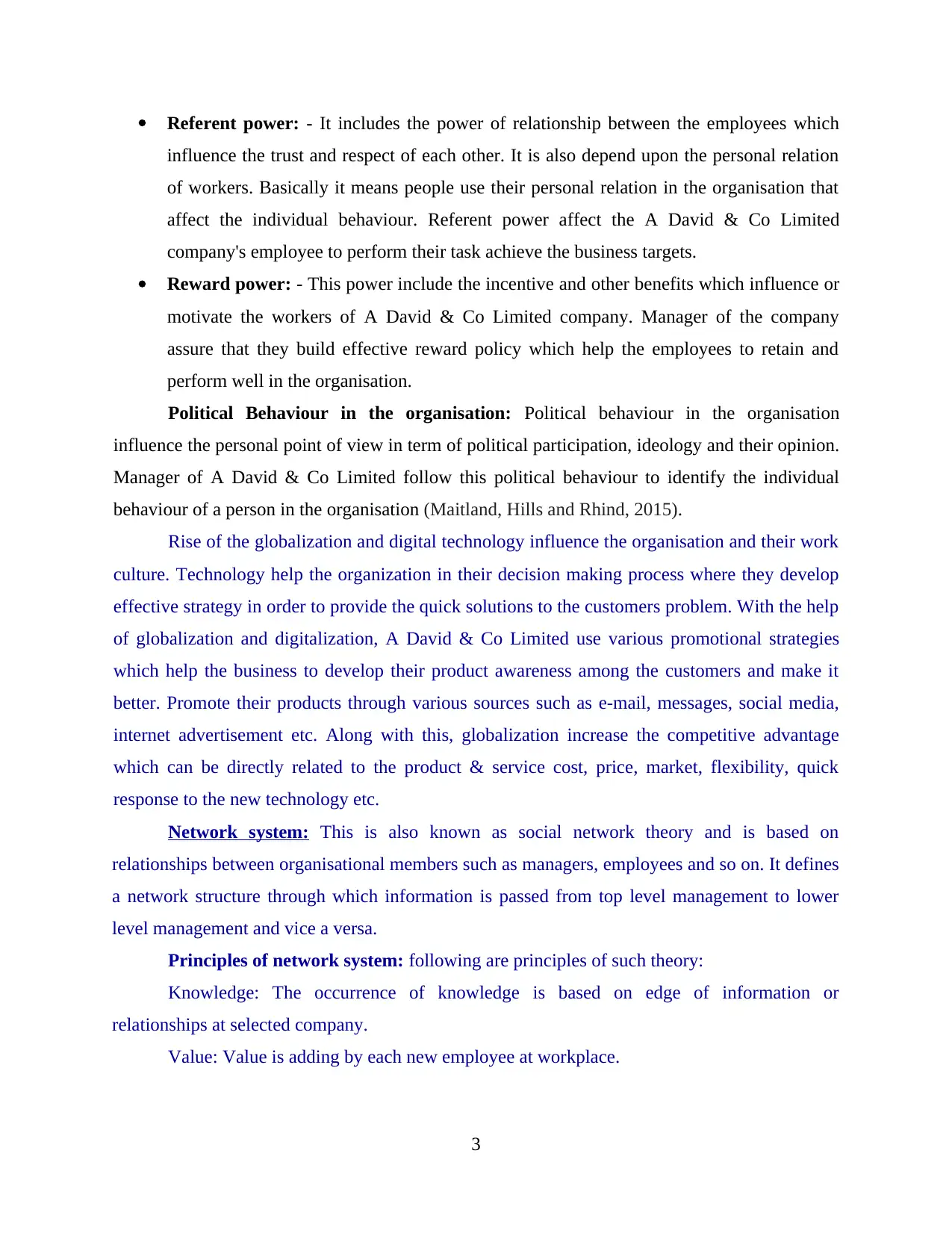
Referent power: - It includes the power of relationship between the employees which
influence the trust and respect of each other. It is also depend upon the personal relation
of workers. Basically it means people use their personal relation in the organisation that
affect the individual behaviour. Referent power affect the A David & Co Limited
company's employee to perform their task achieve the business targets.
Reward power: - This power include the incentive and other benefits which influence or
motivate the workers of A David & Co Limited company. Manager of the company
assure that they build effective reward policy which help the employees to retain and
perform well in the organisation.
Political Behaviour in the organisation: Political behaviour in the organisation
influence the personal point of view in term of political participation, ideology and their opinion.
Manager of A David & Co Limited follow this political behaviour to identify the individual
behaviour of a person in the organisation (Maitland, Hills and Rhind, 2015).
Rise of the globalization and digital technology influence the organisation and their work
culture. Technology help the organization in their decision making process where they develop
effective strategy in order to provide the quick solutions to the customers problem. With the help
of globalization and digitalization, A David & Co Limited use various promotional strategies
which help the business to develop their product awareness among the customers and make it
better. Promote their products through various sources such as e-mail, messages, social media,
internet advertisement etc. Along with this, globalization increase the competitive advantage
which can be directly related to the product & service cost, price, market, flexibility, quick
response to the new technology etc.
Network system: This is also known as social network theory and is based on
relationships between organisational members such as managers, employees and so on. It defines
a network structure through which information is passed from top level management to lower
level management and vice a versa.
Principles of network system: following are principles of such theory:
Knowledge: The occurrence of knowledge is based on edge of information or
relationships at selected company.
Value: Value is adding by each new employee at workplace.
3
influence the trust and respect of each other. It is also depend upon the personal relation
of workers. Basically it means people use their personal relation in the organisation that
affect the individual behaviour. Referent power affect the A David & Co Limited
company's employee to perform their task achieve the business targets.
Reward power: - This power include the incentive and other benefits which influence or
motivate the workers of A David & Co Limited company. Manager of the company
assure that they build effective reward policy which help the employees to retain and
perform well in the organisation.
Political Behaviour in the organisation: Political behaviour in the organisation
influence the personal point of view in term of political participation, ideology and their opinion.
Manager of A David & Co Limited follow this political behaviour to identify the individual
behaviour of a person in the organisation (Maitland, Hills and Rhind, 2015).
Rise of the globalization and digital technology influence the organisation and their work
culture. Technology help the organization in their decision making process where they develop
effective strategy in order to provide the quick solutions to the customers problem. With the help
of globalization and digitalization, A David & Co Limited use various promotional strategies
which help the business to develop their product awareness among the customers and make it
better. Promote their products through various sources such as e-mail, messages, social media,
internet advertisement etc. Along with this, globalization increase the competitive advantage
which can be directly related to the product & service cost, price, market, flexibility, quick
response to the new technology etc.
Network system: This is also known as social network theory and is based on
relationships between organisational members such as managers, employees and so on. It defines
a network structure through which information is passed from top level management to lower
level management and vice a versa.
Principles of network system: following are principles of such theory:
Knowledge: The occurrence of knowledge is based on edge of information or
relationships at selected company.
Value: Value is adding by each new employee at workplace.
3
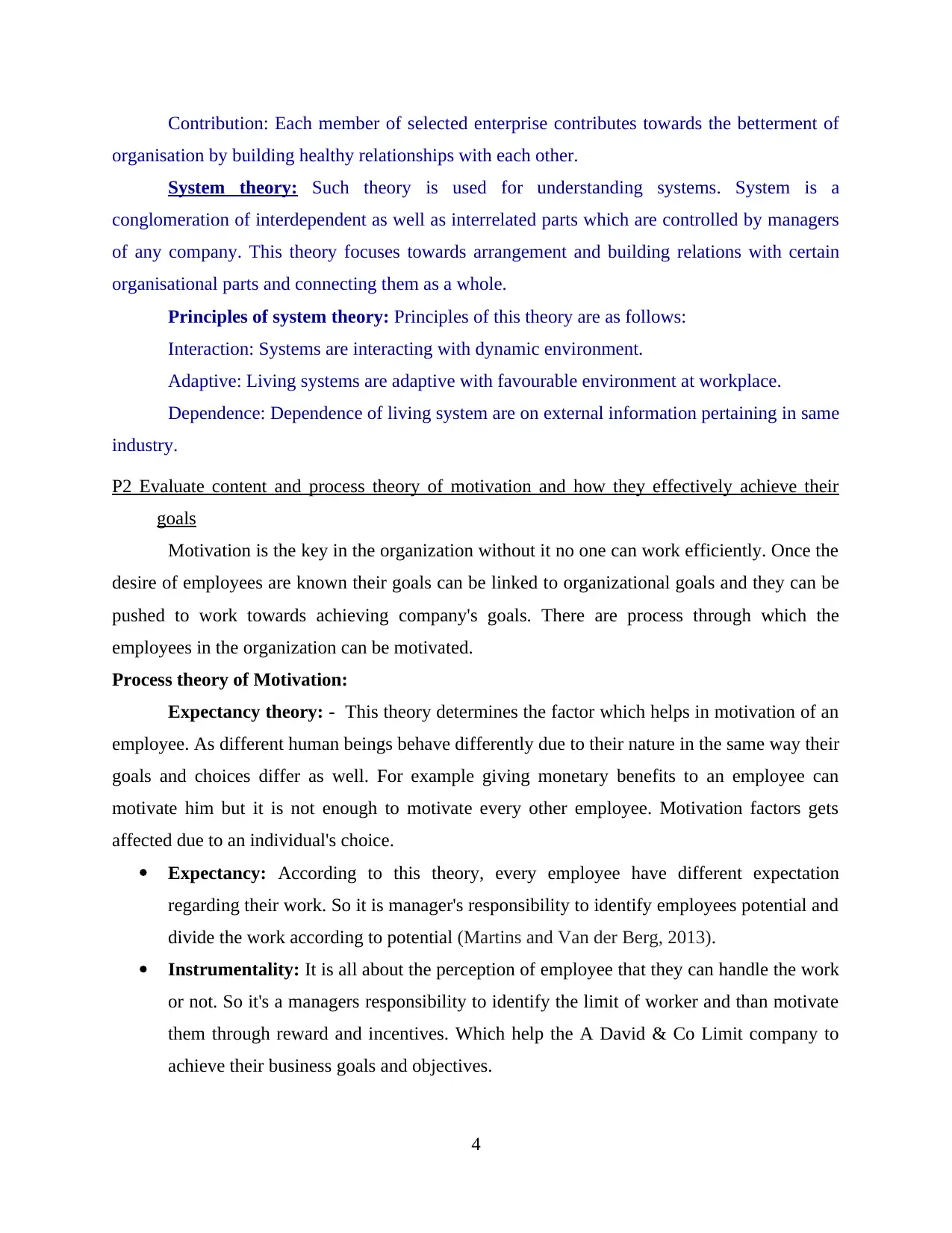
Contribution: Each member of selected enterprise contributes towards the betterment of
organisation by building healthy relationships with each other.
System theory: Such theory is used for understanding systems. System is a
conglomeration of interdependent as well as interrelated parts which are controlled by managers
of any company. This theory focuses towards arrangement and building relations with certain
organisational parts and connecting them as a whole.
Principles of system theory: Principles of this theory are as follows:
Interaction: Systems are interacting with dynamic environment.
Adaptive: Living systems are adaptive with favourable environment at workplace.
Dependence: Dependence of living system are on external information pertaining in same
industry.
P2 Evaluate content and process theory of motivation and how they effectively achieve their
goals
Motivation is the key in the organization without it no one can work efficiently. Once the
desire of employees are known their goals can be linked to organizational goals and they can be
pushed to work towards achieving company's goals. There are process through which the
employees in the organization can be motivated.
Process theory of Motivation:
Expectancy theory: - This theory determines the factor which helps in motivation of an
employee. As different human beings behave differently due to their nature in the same way their
goals and choices differ as well. For example giving monetary benefits to an employee can
motivate him but it is not enough to motivate every other employee. Motivation factors gets
affected due to an individual's choice.
Expectancy: According to this theory, every employee have different expectation
regarding their work. So it is manager's responsibility to identify employees potential and
divide the work according to potential (Martins and Van der Berg, 2013).
Instrumentality: It is all about the perception of employee that they can handle the work
or not. So it's a managers responsibility to identify the limit of worker and than motivate
them through reward and incentives. Which help the A David & Co Limit company to
achieve their business goals and objectives.
4
organisation by building healthy relationships with each other.
System theory: Such theory is used for understanding systems. System is a
conglomeration of interdependent as well as interrelated parts which are controlled by managers
of any company. This theory focuses towards arrangement and building relations with certain
organisational parts and connecting them as a whole.
Principles of system theory: Principles of this theory are as follows:
Interaction: Systems are interacting with dynamic environment.
Adaptive: Living systems are adaptive with favourable environment at workplace.
Dependence: Dependence of living system are on external information pertaining in same
industry.
P2 Evaluate content and process theory of motivation and how they effectively achieve their
goals
Motivation is the key in the organization without it no one can work efficiently. Once the
desire of employees are known their goals can be linked to organizational goals and they can be
pushed to work towards achieving company's goals. There are process through which the
employees in the organization can be motivated.
Process theory of Motivation:
Expectancy theory: - This theory determines the factor which helps in motivation of an
employee. As different human beings behave differently due to their nature in the same way their
goals and choices differ as well. For example giving monetary benefits to an employee can
motivate him but it is not enough to motivate every other employee. Motivation factors gets
affected due to an individual's choice.
Expectancy: According to this theory, every employee have different expectation
regarding their work. So it is manager's responsibility to identify employees potential and
divide the work according to potential (Martins and Van der Berg, 2013).
Instrumentality: It is all about the perception of employee that they can handle the work
or not. So it's a managers responsibility to identify the limit of worker and than motivate
them through reward and incentives. Which help the A David & Co Limit company to
achieve their business goals and objectives.
4
⊘ This is a preview!⊘
Do you want full access?
Subscribe today to unlock all pages.

Trusted by 1+ million students worldwide
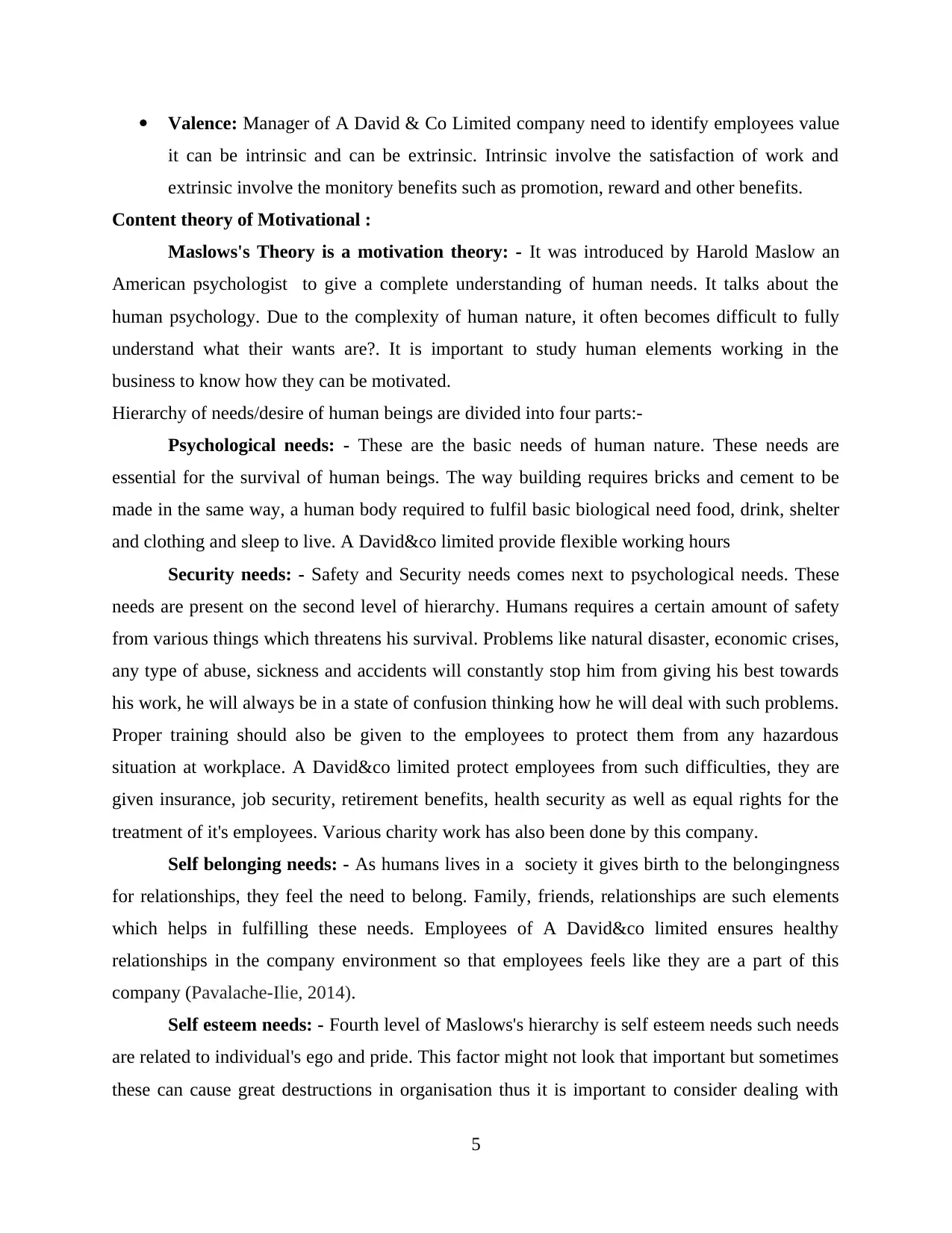
Valence: Manager of A David & Co Limited company need to identify employees value
it can be intrinsic and can be extrinsic. Intrinsic involve the satisfaction of work and
extrinsic involve the monitory benefits such as promotion, reward and other benefits.
Content theory of Motivational :
Maslows's Theory is a motivation theory: - It was introduced by Harold Maslow an
American psychologist to give a complete understanding of human needs. It talks about the
human psychology. Due to the complexity of human nature, it often becomes difficult to fully
understand what their wants are?. It is important to study human elements working in the
business to know how they can be motivated.
Hierarchy of needs/desire of human beings are divided into four parts:-
Psychological needs: - These are the basic needs of human nature. These needs are
essential for the survival of human beings. The way building requires bricks and cement to be
made in the same way, a human body required to fulfil basic biological need food, drink, shelter
and clothing and sleep to live. A David&co limited provide flexible working hours
Security needs: - Safety and Security needs comes next to psychological needs. These
needs are present on the second level of hierarchy. Humans requires a certain amount of safety
from various things which threatens his survival. Problems like natural disaster, economic crises,
any type of abuse, sickness and accidents will constantly stop him from giving his best towards
his work, he will always be in a state of confusion thinking how he will deal with such problems.
Proper training should also be given to the employees to protect them from any hazardous
situation at workplace. A David&co limited protect employees from such difficulties, they are
given insurance, job security, retirement benefits, health security as well as equal rights for the
treatment of it's employees. Various charity work has also been done by this company.
Self belonging needs: - As humans lives in a society it gives birth to the belongingness
for relationships, they feel the need to belong. Family, friends, relationships are such elements
which helps in fulfilling these needs. Employees of A David&co limited ensures healthy
relationships in the company environment so that employees feels like they are a part of this
company (Pavalache-Ilie, 2014).
Self esteem needs: - Fourth level of Maslows's hierarchy is self esteem needs such needs
are related to individual's ego and pride. This factor might not look that important but sometimes
these can cause great destructions in organisation thus it is important to consider dealing with
5
it can be intrinsic and can be extrinsic. Intrinsic involve the satisfaction of work and
extrinsic involve the monitory benefits such as promotion, reward and other benefits.
Content theory of Motivational :
Maslows's Theory is a motivation theory: - It was introduced by Harold Maslow an
American psychologist to give a complete understanding of human needs. It talks about the
human psychology. Due to the complexity of human nature, it often becomes difficult to fully
understand what their wants are?. It is important to study human elements working in the
business to know how they can be motivated.
Hierarchy of needs/desire of human beings are divided into four parts:-
Psychological needs: - These are the basic needs of human nature. These needs are
essential for the survival of human beings. The way building requires bricks and cement to be
made in the same way, a human body required to fulfil basic biological need food, drink, shelter
and clothing and sleep to live. A David&co limited provide flexible working hours
Security needs: - Safety and Security needs comes next to psychological needs. These
needs are present on the second level of hierarchy. Humans requires a certain amount of safety
from various things which threatens his survival. Problems like natural disaster, economic crises,
any type of abuse, sickness and accidents will constantly stop him from giving his best towards
his work, he will always be in a state of confusion thinking how he will deal with such problems.
Proper training should also be given to the employees to protect them from any hazardous
situation at workplace. A David&co limited protect employees from such difficulties, they are
given insurance, job security, retirement benefits, health security as well as equal rights for the
treatment of it's employees. Various charity work has also been done by this company.
Self belonging needs: - As humans lives in a society it gives birth to the belongingness
for relationships, they feel the need to belong. Family, friends, relationships are such elements
which helps in fulfilling these needs. Employees of A David&co limited ensures healthy
relationships in the company environment so that employees feels like they are a part of this
company (Pavalache-Ilie, 2014).
Self esteem needs: - Fourth level of Maslows's hierarchy is self esteem needs such needs
are related to individual's ego and pride. This factor might not look that important but sometimes
these can cause great destructions in organisation thus it is important to consider dealing with
5
Paraphrase This Document
Need a fresh take? Get an instant paraphrase of this document with our AI Paraphraser
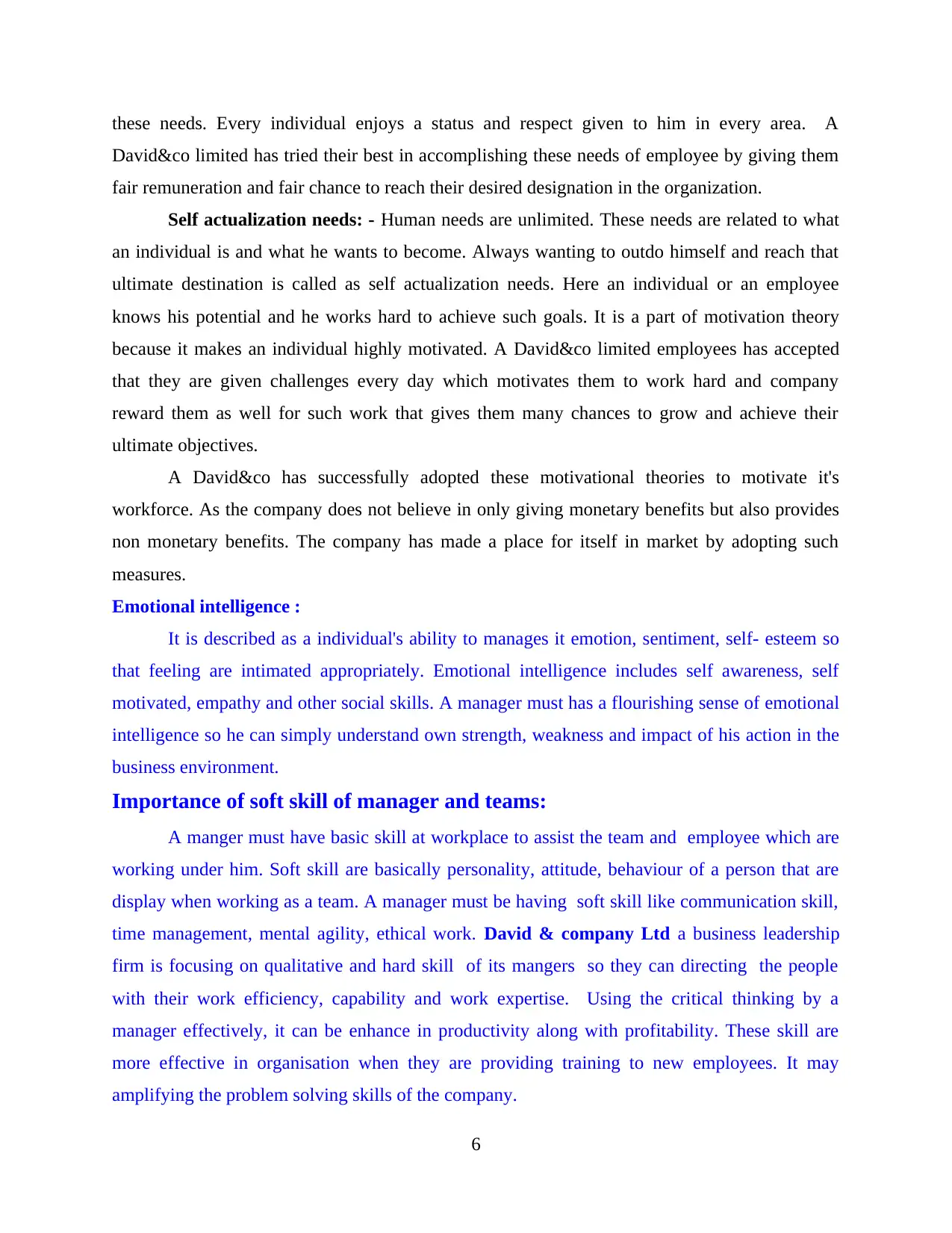
these needs. Every individual enjoys a status and respect given to him in every area. A
David&co limited has tried their best in accomplishing these needs of employee by giving them
fair remuneration and fair chance to reach their desired designation in the organization.
Self actualization needs: - Human needs are unlimited. These needs are related to what
an individual is and what he wants to become. Always wanting to outdo himself and reach that
ultimate destination is called as self actualization needs. Here an individual or an employee
knows his potential and he works hard to achieve such goals. It is a part of motivation theory
because it makes an individual highly motivated. A David&co limited employees has accepted
that they are given challenges every day which motivates them to work hard and company
reward them as well for such work that gives them many chances to grow and achieve their
ultimate objectives.
A David&co has successfully adopted these motivational theories to motivate it's
workforce. As the company does not believe in only giving monetary benefits but also provides
non monetary benefits. The company has made a place for itself in market by adopting such
measures.
Emotional intelligence :
It is described as a individual's ability to manages it emotion, sentiment, self- esteem so
that feeling are intimated appropriately. Emotional intelligence includes self awareness, self
motivated, empathy and other social skills. A manager must has a flourishing sense of emotional
intelligence so he can simply understand own strength, weakness and impact of his action in the
business environment.
Importance of soft skill of manager and teams:
A manger must have basic skill at workplace to assist the team and employee which are
working under him. Soft skill are basically personality, attitude, behaviour of a person that are
display when working as a team. A manager must be having soft skill like communication skill,
time management, mental agility, ethical work. David & company Ltd a business leadership
firm is focusing on qualitative and hard skill of its mangers so they can directing the people
with their work efficiency, capability and work expertise. Using the critical thinking by a
manager effectively, it can be enhance in productivity along with profitability. These skill are
more effective in organisation when they are providing training to new employees. It may
amplifying the problem solving skills of the company.
6
David&co limited has tried their best in accomplishing these needs of employee by giving them
fair remuneration and fair chance to reach their desired designation in the organization.
Self actualization needs: - Human needs are unlimited. These needs are related to what
an individual is and what he wants to become. Always wanting to outdo himself and reach that
ultimate destination is called as self actualization needs. Here an individual or an employee
knows his potential and he works hard to achieve such goals. It is a part of motivation theory
because it makes an individual highly motivated. A David&co limited employees has accepted
that they are given challenges every day which motivates them to work hard and company
reward them as well for such work that gives them many chances to grow and achieve their
ultimate objectives.
A David&co has successfully adopted these motivational theories to motivate it's
workforce. As the company does not believe in only giving monetary benefits but also provides
non monetary benefits. The company has made a place for itself in market by adopting such
measures.
Emotional intelligence :
It is described as a individual's ability to manages it emotion, sentiment, self- esteem so
that feeling are intimated appropriately. Emotional intelligence includes self awareness, self
motivated, empathy and other social skills. A manager must has a flourishing sense of emotional
intelligence so he can simply understand own strength, weakness and impact of his action in the
business environment.
Importance of soft skill of manager and teams:
A manger must have basic skill at workplace to assist the team and employee which are
working under him. Soft skill are basically personality, attitude, behaviour of a person that are
display when working as a team. A manager must be having soft skill like communication skill,
time management, mental agility, ethical work. David & company Ltd a business leadership
firm is focusing on qualitative and hard skill of its mangers so they can directing the people
with their work efficiency, capability and work expertise. Using the critical thinking by a
manager effectively, it can be enhance in productivity along with profitability. These skill are
more effective in organisation when they are providing training to new employees. It may
amplifying the problem solving skills of the company.
6
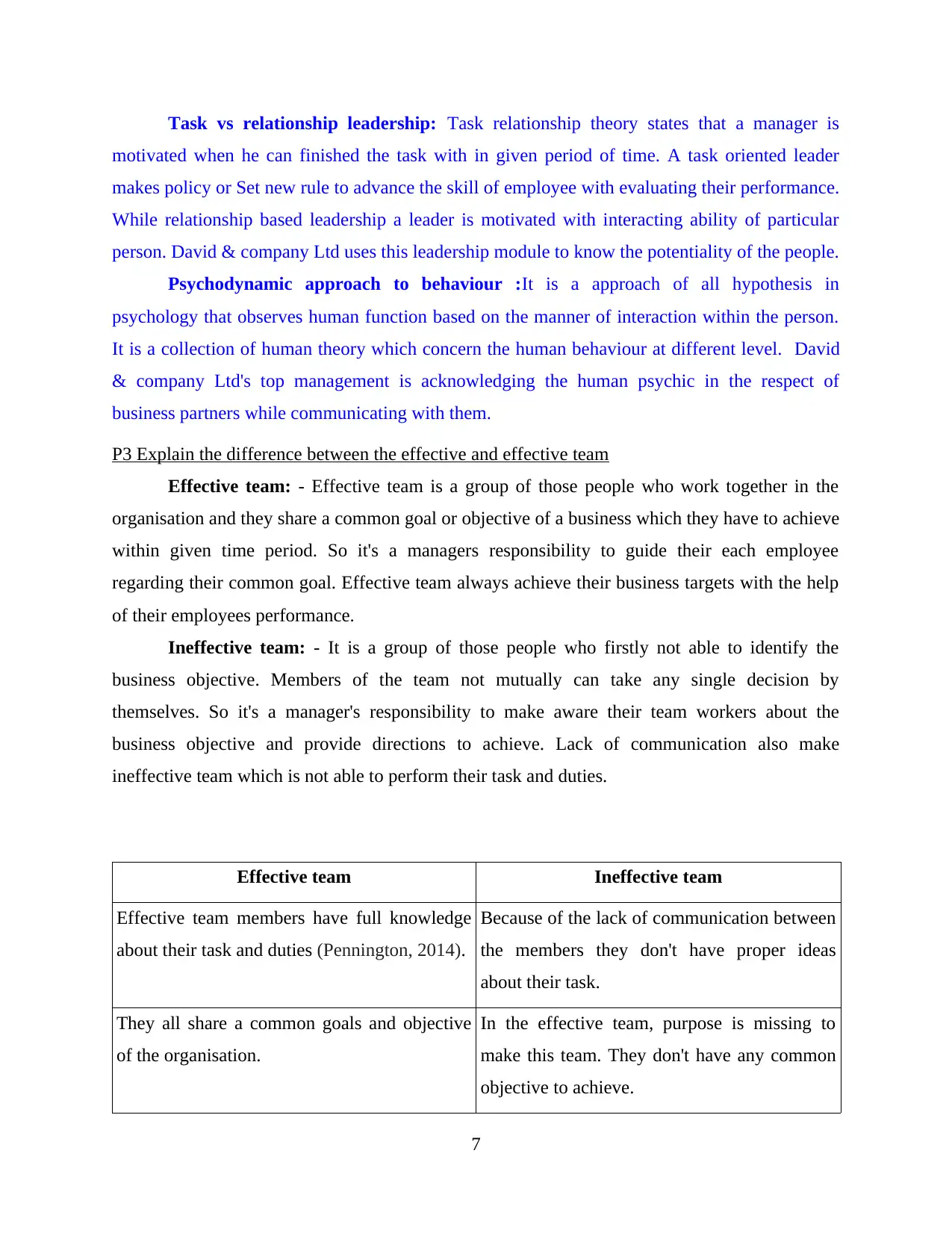
Task vs relationship leadership: Task relationship theory states that a manager is
motivated when he can finished the task with in given period of time. A task oriented leader
makes policy or Set new rule to advance the skill of employee with evaluating their performance.
While relationship based leadership a leader is motivated with interacting ability of particular
person. David & company Ltd uses this leadership module to know the potentiality of the people.
Psychodynamic approach to behaviour :It is a approach of all hypothesis in
psychology that observes human function based on the manner of interaction within the person.
It is a collection of human theory which concern the human behaviour at different level. David
& company Ltd's top management is acknowledging the human psychic in the respect of
business partners while communicating with them.
P3 Explain the difference between the effective and effective team
Effective team: - Effective team is a group of those people who work together in the
organisation and they share a common goal or objective of a business which they have to achieve
within given time period. So it's a managers responsibility to guide their each employee
regarding their common goal. Effective team always achieve their business targets with the help
of their employees performance.
Ineffective team: - It is a group of those people who firstly not able to identify the
business objective. Members of the team not mutually can take any single decision by
themselves. So it's a manager's responsibility to make aware their team workers about the
business objective and provide directions to achieve. Lack of communication also make
ineffective team which is not able to perform their task and duties.
Effective team Ineffective team
Effective team members have full knowledge
about their task and duties (Pennington, 2014).
Because of the lack of communication between
the members they don't have proper ideas
about their task.
They all share a common goals and objective
of the organisation.
In the effective team, purpose is missing to
make this team. They don't have any common
objective to achieve.
7
motivated when he can finished the task with in given period of time. A task oriented leader
makes policy or Set new rule to advance the skill of employee with evaluating their performance.
While relationship based leadership a leader is motivated with interacting ability of particular
person. David & company Ltd uses this leadership module to know the potentiality of the people.
Psychodynamic approach to behaviour :It is a approach of all hypothesis in
psychology that observes human function based on the manner of interaction within the person.
It is a collection of human theory which concern the human behaviour at different level. David
& company Ltd's top management is acknowledging the human psychic in the respect of
business partners while communicating with them.
P3 Explain the difference between the effective and effective team
Effective team: - Effective team is a group of those people who work together in the
organisation and they share a common goal or objective of a business which they have to achieve
within given time period. So it's a managers responsibility to guide their each employee
regarding their common goal. Effective team always achieve their business targets with the help
of their employees performance.
Ineffective team: - It is a group of those people who firstly not able to identify the
business objective. Members of the team not mutually can take any single decision by
themselves. So it's a manager's responsibility to make aware their team workers about the
business objective and provide directions to achieve. Lack of communication also make
ineffective team which is not able to perform their task and duties.
Effective team Ineffective team
Effective team members have full knowledge
about their task and duties (Pennington, 2014).
Because of the lack of communication between
the members they don't have proper ideas
about their task.
They all share a common goals and objective
of the organisation.
In the effective team, purpose is missing to
make this team. They don't have any common
objective to achieve.
7
⊘ This is a preview!⊘
Do you want full access?
Subscribe today to unlock all pages.

Trusted by 1+ million students worldwide
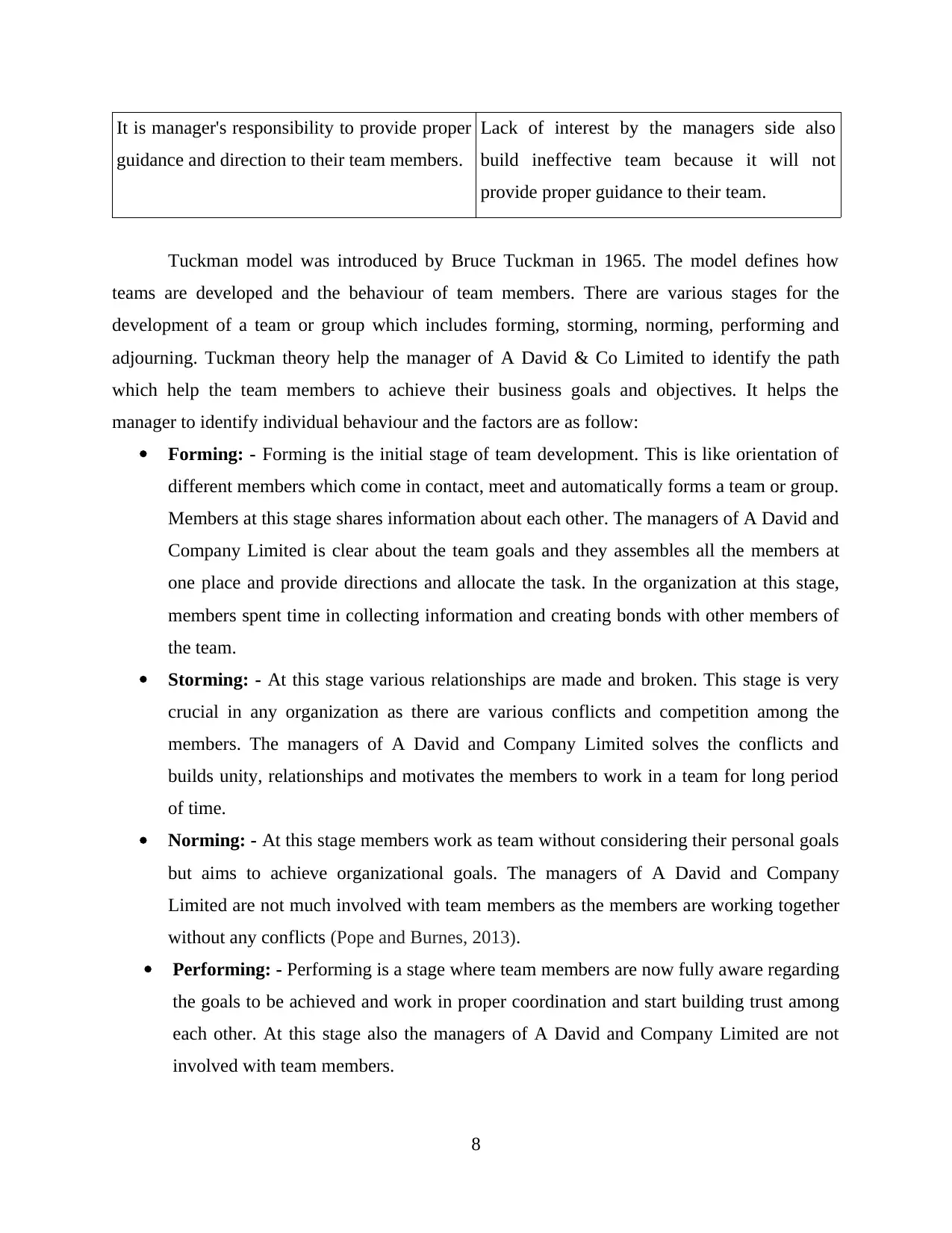
It is manager's responsibility to provide proper
guidance and direction to their team members.
Lack of interest by the managers side also
build ineffective team because it will not
provide proper guidance to their team.
Tuckman model was introduced by Bruce Tuckman in 1965. The model defines how
teams are developed and the behaviour of team members. There are various stages for the
development of a team or group which includes forming, storming, norming, performing and
adjourning. Tuckman theory help the manager of A David & Co Limited to identify the path
which help the team members to achieve their business goals and objectives. It helps the
manager to identify individual behaviour and the factors are as follow:
Forming: - Forming is the initial stage of team development. This is like orientation of
different members which come in contact, meet and automatically forms a team or group.
Members at this stage shares information about each other. The managers of A David and
Company Limited is clear about the team goals and they assembles all the members at
one place and provide directions and allocate the task. In the organization at this stage,
members spent time in collecting information and creating bonds with other members of
the team.
Storming: - At this stage various relationships are made and broken. This stage is very
crucial in any organization as there are various conflicts and competition among the
members. The managers of A David and Company Limited solves the conflicts and
builds unity, relationships and motivates the members to work in a team for long period
of time.
Norming: - At this stage members work as team without considering their personal goals
but aims to achieve organizational goals. The managers of A David and Company
Limited are not much involved with team members as the members are working together
without any conflicts (Pope and Burnes, 2013).
Performing: - Performing is a stage where team members are now fully aware regarding
the goals to be achieved and work in proper coordination and start building trust among
each other. At this stage also the managers of A David and Company Limited are not
involved with team members.
8
guidance and direction to their team members.
Lack of interest by the managers side also
build ineffective team because it will not
provide proper guidance to their team.
Tuckman model was introduced by Bruce Tuckman in 1965. The model defines how
teams are developed and the behaviour of team members. There are various stages for the
development of a team or group which includes forming, storming, norming, performing and
adjourning. Tuckman theory help the manager of A David & Co Limited to identify the path
which help the team members to achieve their business goals and objectives. It helps the
manager to identify individual behaviour and the factors are as follow:
Forming: - Forming is the initial stage of team development. This is like orientation of
different members which come in contact, meet and automatically forms a team or group.
Members at this stage shares information about each other. The managers of A David and
Company Limited is clear about the team goals and they assembles all the members at
one place and provide directions and allocate the task. In the organization at this stage,
members spent time in collecting information and creating bonds with other members of
the team.
Storming: - At this stage various relationships are made and broken. This stage is very
crucial in any organization as there are various conflicts and competition among the
members. The managers of A David and Company Limited solves the conflicts and
builds unity, relationships and motivates the members to work in a team for long period
of time.
Norming: - At this stage members work as team without considering their personal goals
but aims to achieve organizational goals. The managers of A David and Company
Limited are not much involved with team members as the members are working together
without any conflicts (Pope and Burnes, 2013).
Performing: - Performing is a stage where team members are now fully aware regarding
the goals to be achieved and work in proper coordination and start building trust among
each other. At this stage also the managers of A David and Company Limited are not
involved with team members.
8
Paraphrase This Document
Need a fresh take? Get an instant paraphrase of this document with our AI Paraphraser
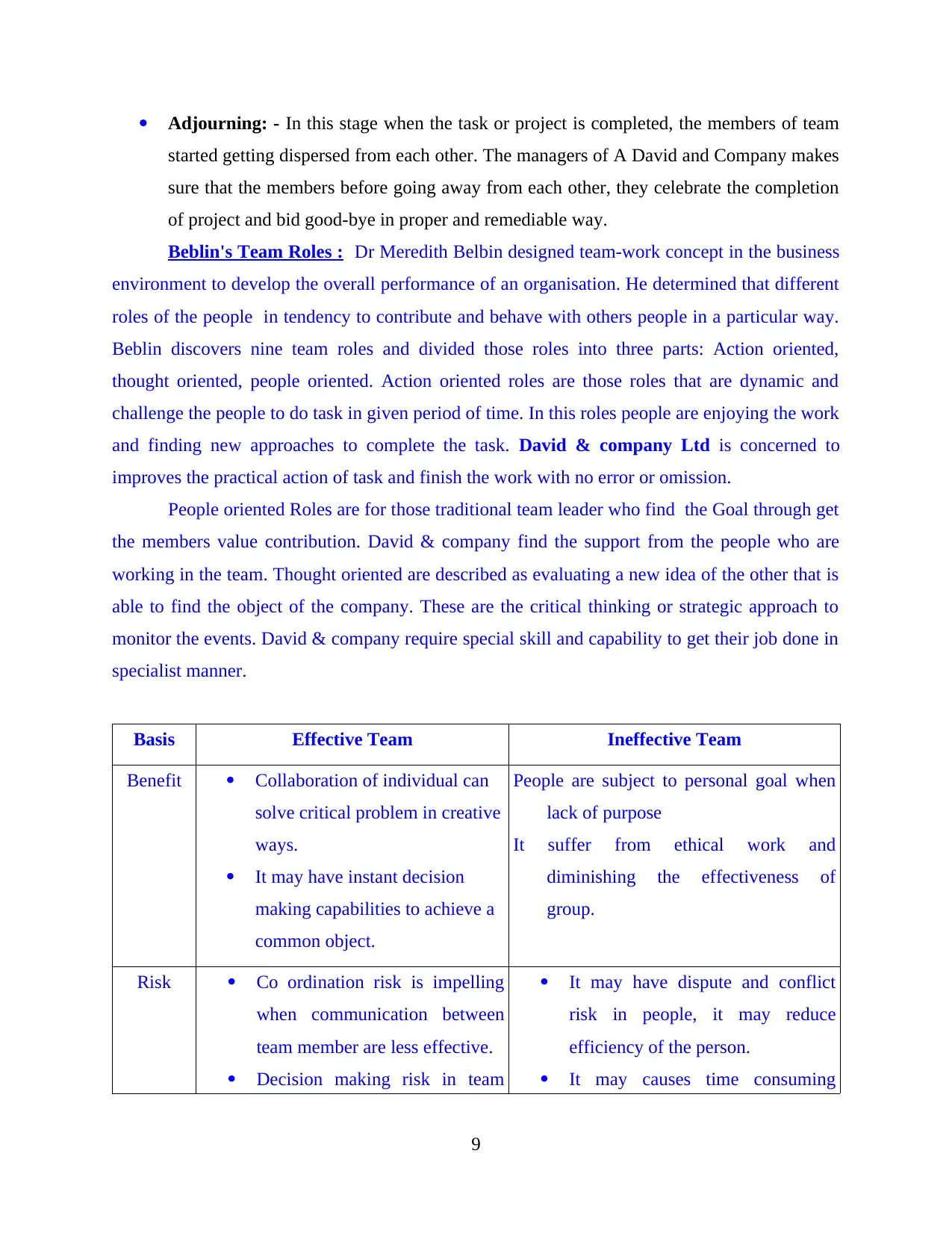
Adjourning: - In this stage when the task or project is completed, the members of team
started getting dispersed from each other. The managers of A David and Company makes
sure that the members before going away from each other, they celebrate the completion
of project and bid good-bye in proper and remediable way.
Beblin's Team Roles : Dr Meredith Belbin designed team-work concept in the business
environment to develop the overall performance of an organisation. He determined that different
roles of the people in tendency to contribute and behave with others people in a particular way.
Beblin discovers nine team roles and divided those roles into three parts: Action oriented,
thought oriented, people oriented. Action oriented roles are those roles that are dynamic and
challenge the people to do task in given period of time. In this roles people are enjoying the work
and finding new approaches to complete the task. David & company Ltd is concerned to
improves the practical action of task and finish the work with no error or omission.
People oriented Roles are for those traditional team leader who find the Goal through get
the members value contribution. David & company find the support from the people who are
working in the team. Thought oriented are described as evaluating a new idea of the other that is
able to find the object of the company. These are the critical thinking or strategic approach to
monitor the events. David & company require special skill and capability to get their job done in
specialist manner.
Basis Effective Team Ineffective Team
Benefit Collaboration of individual can
solve critical problem in creative
ways.
It may have instant decision
making capabilities to achieve a
common object.
People are subject to personal goal when
lack of purpose
It suffer from ethical work and
diminishing the effectiveness of
group.
Risk Co ordination risk is impelling
when communication between
team member are less effective.
Decision making risk in team
It may have dispute and conflict
risk in people, it may reduce
efficiency of the person.
It may causes time consuming
9
started getting dispersed from each other. The managers of A David and Company makes
sure that the members before going away from each other, they celebrate the completion
of project and bid good-bye in proper and remediable way.
Beblin's Team Roles : Dr Meredith Belbin designed team-work concept in the business
environment to develop the overall performance of an organisation. He determined that different
roles of the people in tendency to contribute and behave with others people in a particular way.
Beblin discovers nine team roles and divided those roles into three parts: Action oriented,
thought oriented, people oriented. Action oriented roles are those roles that are dynamic and
challenge the people to do task in given period of time. In this roles people are enjoying the work
and finding new approaches to complete the task. David & company Ltd is concerned to
improves the practical action of task and finish the work with no error or omission.
People oriented Roles are for those traditional team leader who find the Goal through get
the members value contribution. David & company find the support from the people who are
working in the team. Thought oriented are described as evaluating a new idea of the other that is
able to find the object of the company. These are the critical thinking or strategic approach to
monitor the events. David & company require special skill and capability to get their job done in
specialist manner.
Basis Effective Team Ineffective Team
Benefit Collaboration of individual can
solve critical problem in creative
ways.
It may have instant decision
making capabilities to achieve a
common object.
People are subject to personal goal when
lack of purpose
It suffer from ethical work and
diminishing the effectiveness of
group.
Risk Co ordination risk is impelling
when communication between
team member are less effective.
Decision making risk in team
It may have dispute and conflict
risk in people, it may reduce
efficiency of the person.
It may causes time consuming
9
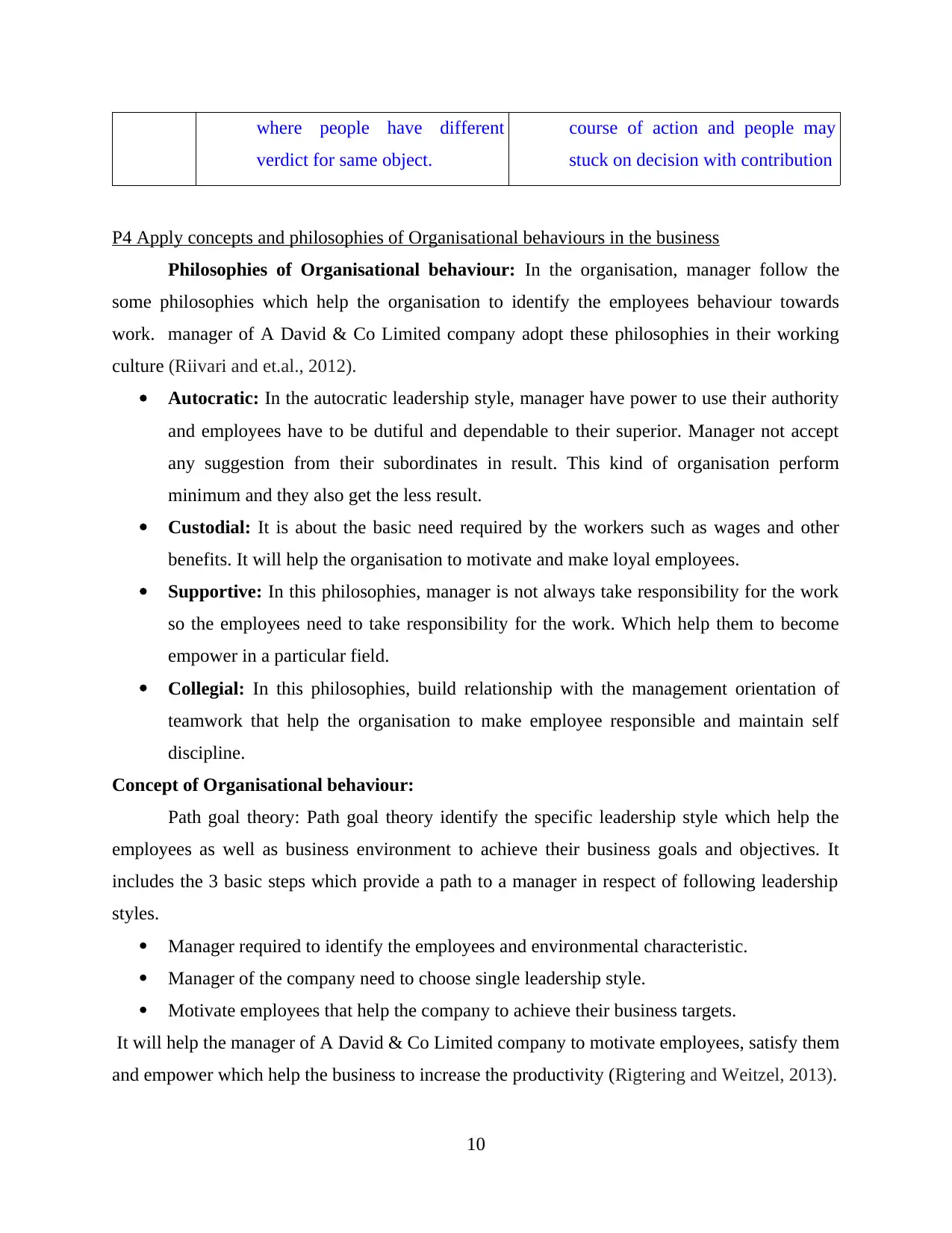
where people have different
verdict for same object.
course of action and people may
stuck on decision with contribution
P4 Apply concepts and philosophies of Organisational behaviours in the business
Philosophies of Organisational behaviour: In the organisation, manager follow the
some philosophies which help the organisation to identify the employees behaviour towards
work. manager of A David & Co Limited company adopt these philosophies in their working
culture (Riivari and et.al., 2012).
Autocratic: In the autocratic leadership style, manager have power to use their authority
and employees have to be dutiful and dependable to their superior. Manager not accept
any suggestion from their subordinates in result. This kind of organisation perform
minimum and they also get the less result.
Custodial: It is about the basic need required by the workers such as wages and other
benefits. It will help the organisation to motivate and make loyal employees.
Supportive: In this philosophies, manager is not always take responsibility for the work
so the employees need to take responsibility for the work. Which help them to become
empower in a particular field.
Collegial: In this philosophies, build relationship with the management orientation of
teamwork that help the organisation to make employee responsible and maintain self
discipline.
Concept of Organisational behaviour:
Path goal theory: Path goal theory identify the specific leadership style which help the
employees as well as business environment to achieve their business goals and objectives. It
includes the 3 basic steps which provide a path to a manager in respect of following leadership
styles.
Manager required to identify the employees and environmental characteristic.
Manager of the company need to choose single leadership style.
Motivate employees that help the company to achieve their business targets.
It will help the manager of A David & Co Limited company to motivate employees, satisfy them
and empower which help the business to increase the productivity (Rigtering and Weitzel, 2013).
10
verdict for same object.
course of action and people may
stuck on decision with contribution
P4 Apply concepts and philosophies of Organisational behaviours in the business
Philosophies of Organisational behaviour: In the organisation, manager follow the
some philosophies which help the organisation to identify the employees behaviour towards
work. manager of A David & Co Limited company adopt these philosophies in their working
culture (Riivari and et.al., 2012).
Autocratic: In the autocratic leadership style, manager have power to use their authority
and employees have to be dutiful and dependable to their superior. Manager not accept
any suggestion from their subordinates in result. This kind of organisation perform
minimum and they also get the less result.
Custodial: It is about the basic need required by the workers such as wages and other
benefits. It will help the organisation to motivate and make loyal employees.
Supportive: In this philosophies, manager is not always take responsibility for the work
so the employees need to take responsibility for the work. Which help them to become
empower in a particular field.
Collegial: In this philosophies, build relationship with the management orientation of
teamwork that help the organisation to make employee responsible and maintain self
discipline.
Concept of Organisational behaviour:
Path goal theory: Path goal theory identify the specific leadership style which help the
employees as well as business environment to achieve their business goals and objectives. It
includes the 3 basic steps which provide a path to a manager in respect of following leadership
styles.
Manager required to identify the employees and environmental characteristic.
Manager of the company need to choose single leadership style.
Motivate employees that help the company to achieve their business targets.
It will help the manager of A David & Co Limited company to motivate employees, satisfy them
and empower which help the business to increase the productivity (Rigtering and Weitzel, 2013).
10
⊘ This is a preview!⊘
Do you want full access?
Subscribe today to unlock all pages.

Trusted by 1+ million students worldwide
1 out of 15
Related Documents
Your All-in-One AI-Powered Toolkit for Academic Success.
+13062052269
info@desklib.com
Available 24*7 on WhatsApp / Email
![[object Object]](/_next/static/media/star-bottom.7253800d.svg)
Unlock your academic potential
Copyright © 2020–2026 A2Z Services. All Rights Reserved. Developed and managed by ZUCOL.





